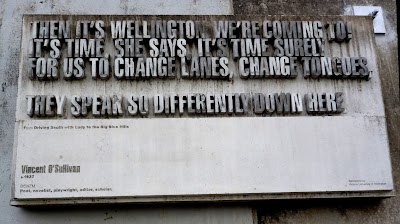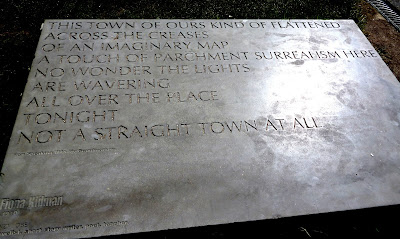Inspired by Wellington is a fascinating little book of fifty pages and came free of charge courtesy of the Wellington i-site. It contains detailed information (including a necessary map) on the quotations by various New Zealand writers that have been placed in rather haphazard fashion around Wellington harbour (either in the form of concrete plaques or metal on benches), and also provides a little information about the writers. There were 19 quotations, but for reasons unknown to me there are now only 16 of the original ones, although (interestingly) four more were unveiled on the day we left Wellington. I keep to the same number pattern as the book.
1. Eileen Duggan (1894–1972)
As it turned out, the first is one of the missing ones, so I could only take a rather useless photo of where it should have been:
'MY QUIET MORNING HILL
STANDS LIKE AN ALTAR DRAWN
WHEREON HUSHED HANDS SHALL LAY
THE SHINING PYX OF DAWN.
STANDS LIKE AN ALTAR DRAWN
WHEREON HUSHED HANDS SHALL LAY
THE SHINING PYX OF DAWN.
WITH PENITENCE AND STIR,
AND DROWSY FLURRY BY,
THE WIND, A SHAMEFACED SERVING-BOY,
COMES RUNNING UP THE SKY.'
AND DROWSY FLURRY BY,
THE WIND, A SHAMEFACED SERVING-BOY,
COMES RUNNING UP THE SKY.'
'The Acolyte', from Selected Poems: Eileen Duggan (ed. Peter Whiteford) (1977).
–––––––––––––––––––––––––––––––––––
2. Dennis Glover (1912–80)
'THE HARBOUR IS AN IRONING BOARD;
FLAT IRON TUGS DASH SMOOTHING TOWARD
ANY SHIRT OF A SHIP, ANY PILLOWSLIP
OF A FREIGHTER THEY DECREE
MUST BE IRONED FLAT AS WASHING FROM THE SEA.'
FLAT IRON TUGS DASH SMOOTHING TOWARD
ANY SHIRT OF A SHIP, ANY PILLOWSLIP
OF A FREIGHTER THEY DECREE
MUST BE IRONED FLAT AS WASHING FROM THE SEA.'
From 'Wellington Harbour is a Laundry' in Come High Water (1977)
–––––––––––––––––––––––––––––––––––
3. Michael King (1945–2004)
'I baited my line, watched it sink, and waited with exquisite anticipation for the pecking of mullet, the sucking of trevally, or – best of all – the sudden pull of kahawai or kingfish.'
From Being Pakeha Now (1999).
–––––––––––––––––––––––––––––––––––
4. Louis Johnson (1924–88)
'From Brooklyn hill, ours is a doll-size city
A formal structure of handpicked squares and bricks
Apprehensible as a child’s construction
Signifying community.'
A formal structure of handpicked squares and bricks
Apprehensible as a child’s construction
Signifying community.'
From 'Last View of Wellington' in Fires and Patterns (1975).
–––––––––––––––––––––––––––––––––––
5. Lauris Edmond (1924–2000)
'IT'S TRUE YOU CAN'T LIVE HERE BY CHANCE,
YOU HAVE TO DO AND BE, NOT SIMPLY WATCH
OR EVEN DESCRIBE. THIS IS THE CITY OF ACTION,
THE WORLD HEADQUARTERS OF THE VERB'
YOU HAVE TO DO AND BE, NOT SIMPLY WATCH
OR EVEN DESCRIBE. THIS IS THE CITY OF ACTION,
THE WORLD HEADQUARTERS OF THE VERB'
From 'The Active Voice' in Scenes from a Small City (1994).
–––––––––––––––––––––––––––––––––––
6. Vincent O'Sullivan (born 1937)
'THEN IT'S WELLINGTON WE'RE COMING TO!
IT'S TIME, SHE SAYS, IT'S TIME SURELY
FOR US TO CHANGE LANES, CHANGE TONGUES,
IT'S TIME, SHE SAYS, IT'S TIME SURELY
FOR US TO CHANGE LANES, CHANGE TONGUES,
THEY SPEAK SO DIFFERENTLY DOWN HERE.'
From 'Driving South with Lucy to the Big Blue Hills' in Seeing You Asked (1998).
–––––––––––––––––––––––––––––––––––
7. Patrick Lawlor
Again, the plaque is missing, but the quotation read:
'AND NOW, AS I GROW IN YEARS,
I FEEL AT TIMES LIKE AN OLD
VIOLIN PLAYED ON BY A MASTER
HAND. YOU, DEAR CITY, ARE
THE MAESTRO DRAWING THE BOW
OVER THE SENSIBILITIES OF MY
MIND, ECHOING THE MUSIC
OF MY DAYS'
I FEEL AT TIMES LIKE AN OLD
VIOLIN PLAYED ON BY A MASTER
HAND. YOU, DEAR CITY, ARE
THE MAESTRO DRAWING THE BOW
OVER THE SENSIBILITIES OF MY
MIND, ECHOING THE MUSIC
OF MY DAYS'
From Old Wellington Days (1959)
–––––––––––––––––––––––––––––––––––
8. Maurice Gee (born 1931).
'THEN OUT OF THE TUNNEL AND
WELLINGTON BURST LIKE A BOMB.
IT OPENED LIKE A FLOWER, WAS
LIT UP LIKE A ROOM, EXPLAINED
ITSELF EXACTLY, BECAME THE
CAPITAL.'
WELLINGTON BURST LIKE A BOMB.
IT OPENED LIKE A FLOWER, WAS
LIT UP LIKE A ROOM, EXPLAINED
ITSELF EXACTLY, BECAME THE
CAPITAL.'
From Going West (1992).
–––––––––––––––––––––––––––––––––––
9. Patricia Grace
'I LOVE THIS CITY, THE HILLS, THE HARBOUR, THE
WIND THAT BLASTS THROUGH IT. I LOVE
THE LIFE AND PULSE AND ACTIVITY, AND THE
WARM DECREPITUDE ... THERE'S ALWAYS AN EDGE
HERE THAT ONE MUST WALK WHICH IS SHARP
AND PRECARIOUS, REQUIRING VIGILANCE.'
WIND THAT BLASTS THROUGH IT. I LOVE
THE LIFE AND PULSE AND ACTIVITY, AND THE
WARM DECREPITUDE ... THERE'S ALWAYS AN EDGE
HERE THAT ONE MUST WALK WHICH IS SHARP
AND PRECARIOUS, REQUIRING VIGILANCE.'
From Cousins (1992)
–––––––––––––––––––––––––––––––––––
10. Bill Manhire (born 1946)
'I LIVE ON THE EDGE
OF THE UNIVERSE,
LIKE EVERYONE ELSE'
OF THE UNIVERSE,
LIKE EVERYONE ELSE'
From 'Milky Way Bar' in Milky Way Bar (1991).
–––––––––––––––––––––––––––––––––––
11. Sam Hunt (born 1946)
WELLINGTON AFLOAT ON THE HARBOUR HAZE ...
YOU THINK OF HOW MOST MEN SPEND THEIR DAYS
IN OFFICES AS CRAMPED AS ELEVATORS –'
From 'Letter to Jerusalem 2' in Collected Poems 1963–1980 (1980).
–––––––––––––––––––––––––––––––––––
12. Bruce Mason (1921–82)
BUT ALL, GIVE THEMSELVES
TO THE ESSENCE OF OUR CULT
– THE RITUAL ASSEMBLY OF AN
INTERESTED COTERIE IN A SPACE
WHERE MAGIC CAN BE MADE
AND MIRACLES OCCUR.'
–––––––––––––––––––––––––––––––––––
13. Alistair Te Ariki Campbell (1925–2009)
OUR WORLD A CUBE OF SUNLIGHT –
BUT TO THE SOUTH
THE VIOLET ADMONITION
OF THUNDER.'
–––––––––––––––––––––––––––––––––––
14. Robin Hyde (1906–39)
ERE WE CAME BY THE RUSTLING JEST OF THE PAPER KINGS,
I WHO AM OVERBOLD WILL BE STEADILY BOLD,
IN THE COUNTED TALE OF THINGS.'
From 'Words' in Young Knowledge: The Poems of Robin Hyde (ed. Michele Leggott) (2003).
–––––––––––––––––––––––––––––––––––
15. James K. Baxter (1926–72)
This is the final plaque that's missing, and from photos it does seem to have been floating in the sea. The words are well known:
'I SAW THE MAORI JESUS
WALKING ON WELLINGTON HARBOUR.
HE WORE BLUE DUNGAREES.
HIS BEARD AND HAIR WERE LONG.
HIS BREATH SMELT OF MUSSELS AND PARAOA.
WHEN HE SMILED IT LOOKED LIKE THE DAWN.'
WALKING ON WELLINGTON HARBOUR.
HE WORE BLUE DUNGAREES.
HIS BEARD AND HAIR WERE LONG.
HIS BREATH SMELT OF MUSSELS AND PARAOA.
WHEN HE SMILED IT LOOKED LIKE THE DAWN.'
–––––––––––––––––––––––––––––––––––
16. Katherine Mansfield (1888–1923).
LEGS JUST TOUCHING, THEY
STRIDE LIKE ONE EAGER
PERSON THROUGH THE TOWN,
DOWN THE ASHPHALT ZIGZAG
WHERE THE FENNEL GROWS
WILD... THE WIND IS SO
STRONG THAT THEY HAVE
TO FIGHT THEIR WAY
THROUGH IT, ROCKING LIKE
TWO OLD DRUNKARDS.'
–––––––––––––––––––––––––––––––––––
17. Marilyn Duckworth (born 1935)
bay opened up beneath us, like a shell splashed
with beads of light.'
From Barbarous Tongue (1963).
–––––––––––––––––––––––––––––––––––
18. Fiona Kidman (born 1940)
ACROSS THE CREASES
OF AN IMAGINARY MAP
A TOUCH OF PARCHMENT SURREALISM HERE
NO WONDER THE LIGHTS
ARE WAVERING
ALL OVER THE PLACE
TONIGHT
NOT A STRAIGHT TOWN AT ALL'
–––––––––––––––––––––––––––––––––––
19. Barbara Anderson (1925–2013)
The final plaque of the original walk is in the suburb of Roseneath. Barbara Anderson died five days after I took this photo.
GOOD. THE TUGGING WIND
TRAPPED AND CORNERED BY
BUILDINGS, STEEP SHORT
CUTS BORDERED BY GARDEN
ESCAPES, PRECIPITOUS GULLIES,
WHERE THROTTLING GREEN
CREEPERS BLANKETED THE
TREES BENEATH.'
–––––––––––––––––––––––––––––––––––
(As you can see at the bottom right of the photos below, it's the names of the writers and the sources of the quotations that were unveiled, not the quotations themselves.)
Elizabeth Knox (born 1959)
topped-up trembling horizon beyond Pencarrow Head would
begin to look like a seaport in someone's lost paradise.'
–––––––––––––––––––––––––––––––––––
Joy Cowley (born 1936)
and shakes its skirts over the harbour
in a wild fandango that attracts
the pale moths of yachts in droves.'
–––––––––––––––––––––––––––––––––––
There are several differences between this verse and the one published on Joy Cowley's web site in February this year announcing (very modestly, as she says she doesn't consider herself a poet) the unveiling, and these are no doubt an indication of different states of the poem.
James McNeish (born 1931)
'A ruffian wind is bliss, a blind man's
comfort station. When I get tired of walking
around it, I can always lean against it.'
From The Crime of Huey Dunstan (2010).
–––––––––––––––––––––––––––––––––––
Jack Lasenby (born 1932)
Lasenby's quotation was actually largely hidden before the unveiling, and it is vertical as it is on a pole – there are a few photos of the unveiling on flickr, although I don't know the source of this admirable (albeit utopian) quotation:
'I want to live among people who believe in truth and freedom...
I want to discuss ideas... I want books...'
The links to my posts below may also be of interest:
–––––––––––––––––––––––––––––––––––
The Writers' Plaques, Christchurch, New Zealand
Writers' Walk, Dunedin, New Zealand






























No comments:
Post a Comment